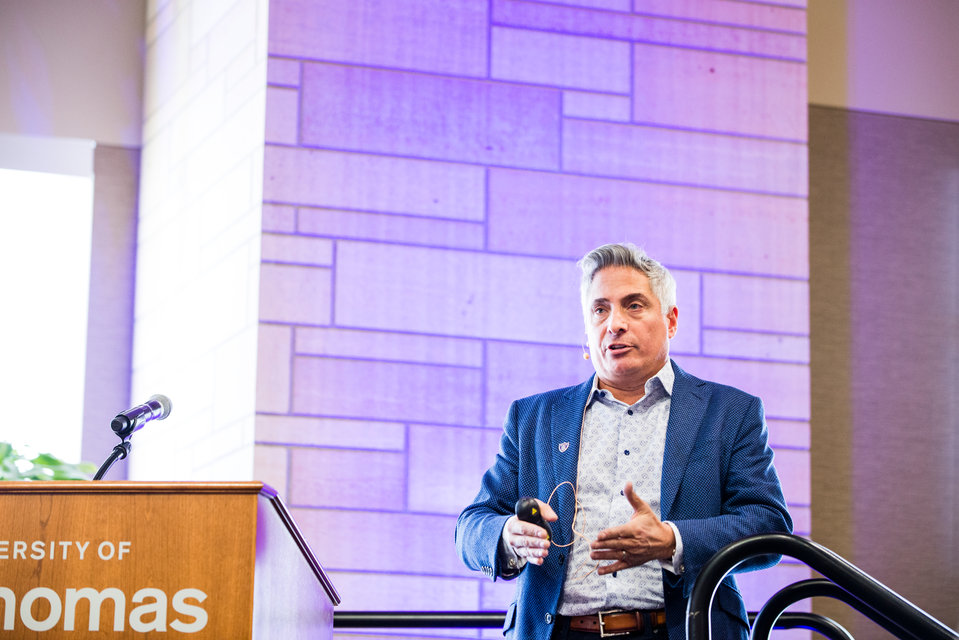John "Ozzie" Nelson '87 is CEO and chairman of Nelson, an integrated, award-winning architecture, design and strategy firm. Recently named a "Most Admired CEO" by Minneapolis/St. Paul Business Journal, Nelson is also a College of Arts and Sciences advisory board member and will be delivering the keynote address, "Shaping our Future: The Art and Science of Experiential Design" at this year's CAS Convening the College event.
The Newsroom caught up with Nelson on the St. Paul campus to hear about his continued relationship with the university and optimistic attitude about the future.
I won’t ask you to boil down your Convening the College presentation completely, but I'm curious about your ideas of experiential design and living as part of how students shape the future.
This talk was more of a journey for me than anticipated. I started down this path of how different the future will be. I caught myself. When we start by thinking about our differences, we forget our humanity. So I thought, 'Let me step back and pick the five things I think have driven mankind to seek experiences, from the cave to today.' The search for knowledge and connection, seeking the sense of community, those have not changed in what people are looking for. … Coming from that, there will be this change in these holistic experiences that are all at once built environment, artificial intelligence, social media, all these creating these experiences where people are in and out of reality.
The best way to shape the future is for everyone to understand what the components for the future are, and to be shape them for the common good. People are either reacting to what’s going on around them or shaping it, and we live in times where shaping it is more exciting.
So many people think of technology as shaping our future and people becoming less caring, more sterile. The empirical evidence doesn’t point to that. If anything, the combination of technology and societal and institutional walls coming down, people are engaging more than ever. We have the needle moving more to the good than the bad.
You’ve taken an active role as an alumnus and have a lot of connections here. Why do you feel it’s important to have that relationship with St. Thomas and stay involved?
I am really taken by Dr. [Julie] Sullivan’s vision for the institution. While there are a lot of things that have stayed the same since I was a student, a lot has changed, and much of that has to do with a broader ambition. St. Thomas in my day had a much more parochial view of itself. … Today, it’s a broader mission of serving the common good, which is something I’m very energized about.
I’ve always felt college students have a responsibility ... to be out there speaking their mind and talking about the way the world should change. ... I think, not only should college students be doing that, universities and colleges today should, too, especially in a world that is losing its way in not having enough civil discourse. It seems people use data to cement their points of view as opposed to understanding it, truly. I think St. Thomas is doing a great job of educating around that.
I also am enjoying working with CAS Dean Dr. Yohuru Williams so much. He’s another visionary who’s so articulate and has a great vision.
You’ve had a career that lends you so much experience to draw from, it has to be exciting to be part of the conversation of what St. Thomas continues evolving to be?
That is absolutely true. On the other hand, these are times that require people to have humility. The world is changing so much; I can learn as much, if not more, from what the university and students are doing. It keeps me fresh. The key to being successful in the world is understanding how the paradigms change. I think students, people of that age, are much more on the cutting edge of how paradigms are shifting. Selfishly, it’s great for me to stay current.
Especially with CAS, what’s your sense of how we're helping students have a positive impact in the world?
I think this whole idea of turning the ivory tower on its ear, having the world be the classroom, that's what we’re doing more of with SOLV initiatives, supporting more study abroad. This is a nucleus of education, and there’s much more of a worldly education than happened in the past. That’s exciting for the world and communities benefiting from that, and there’s no better experience than for students to go out and do all kinds of things in the community.







